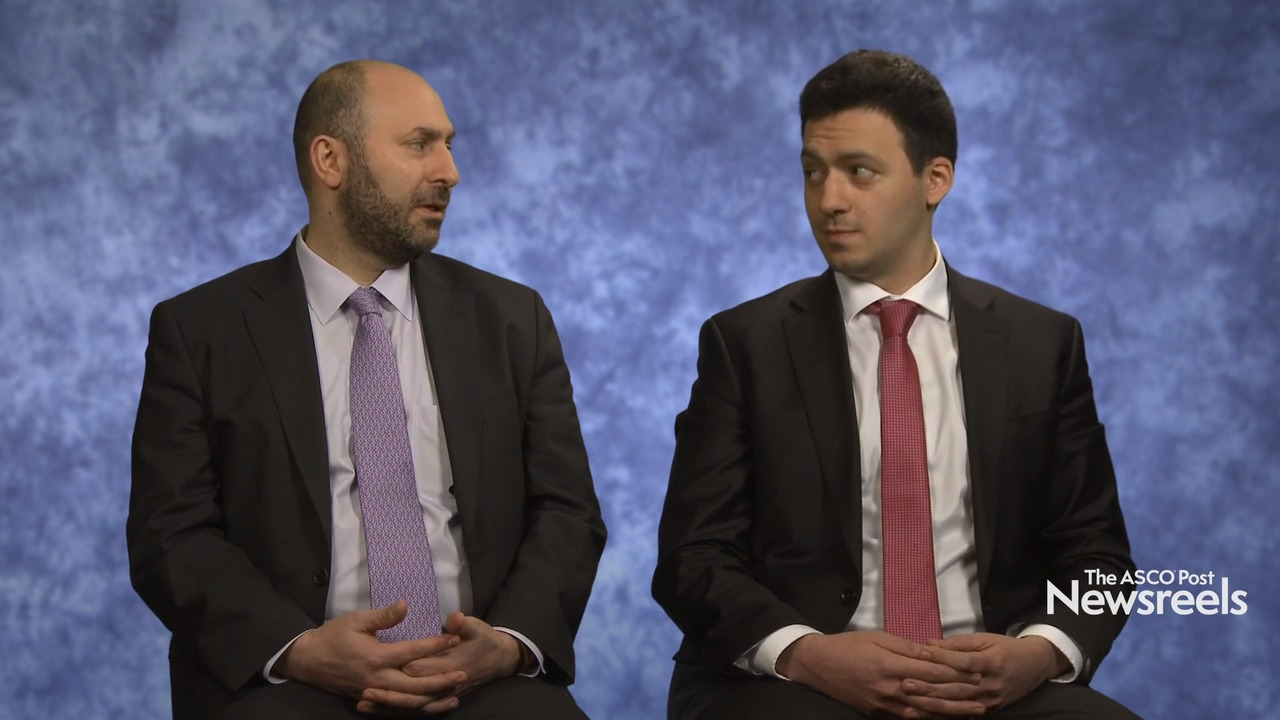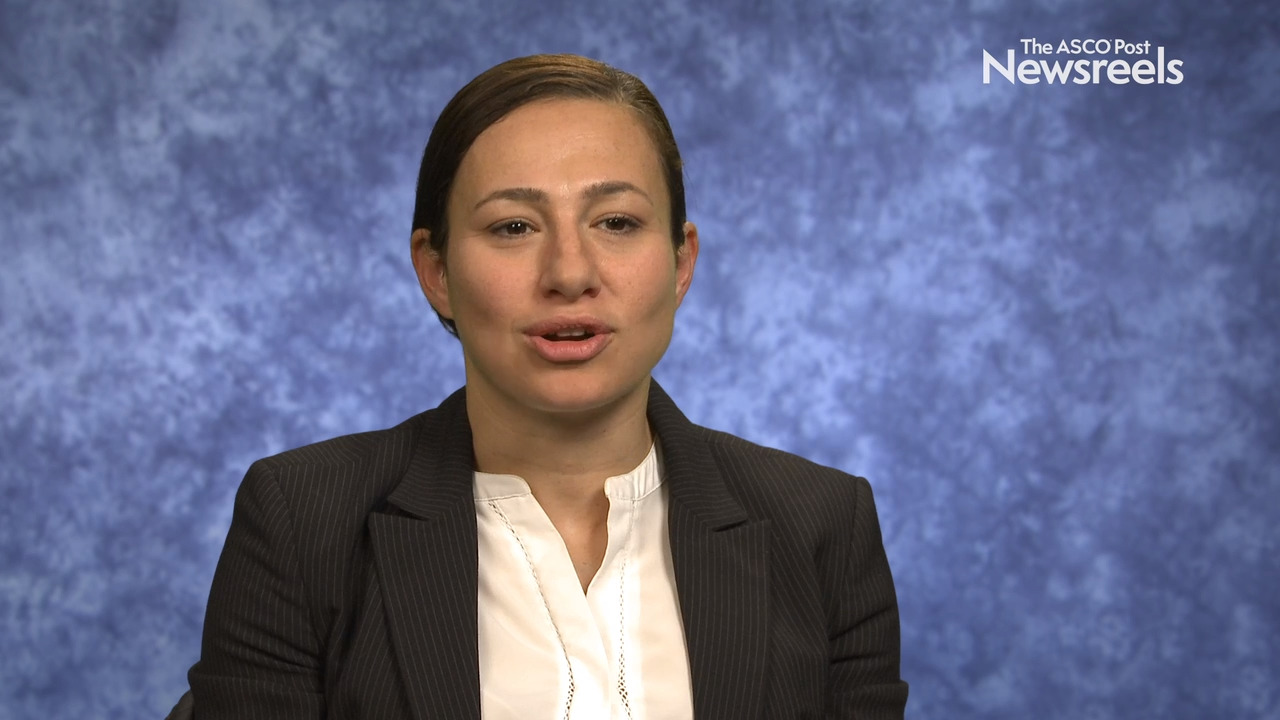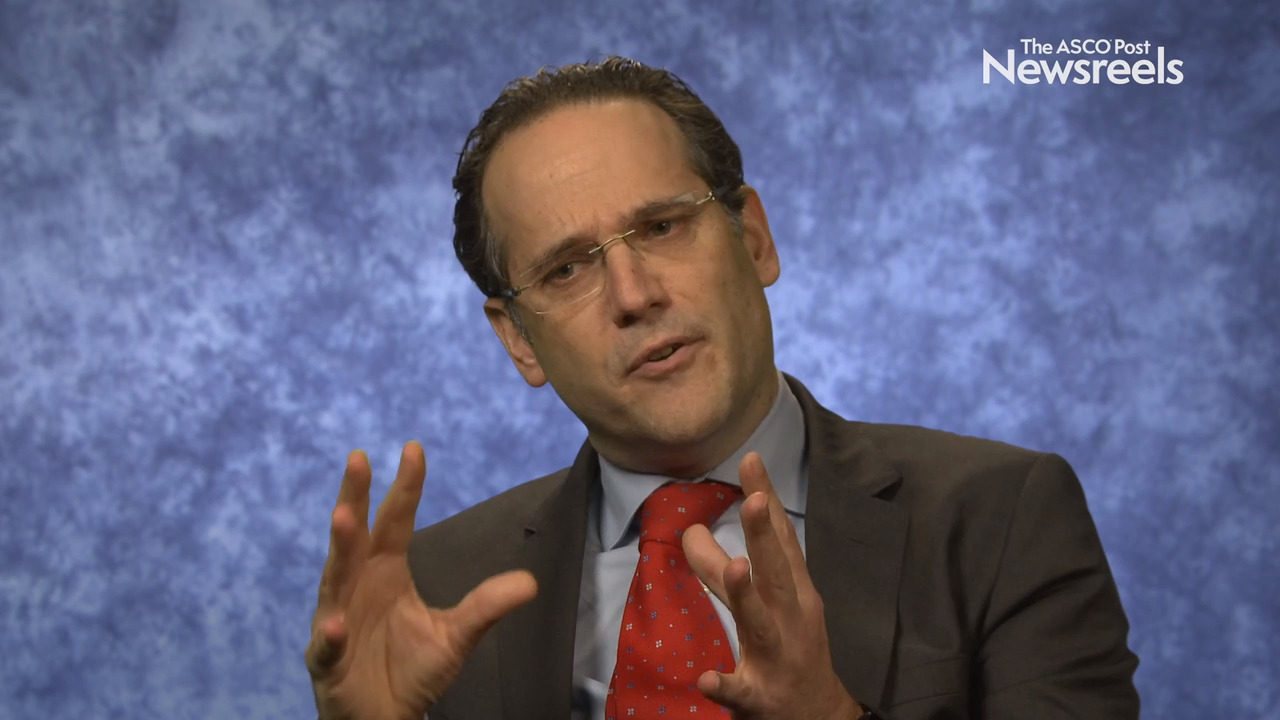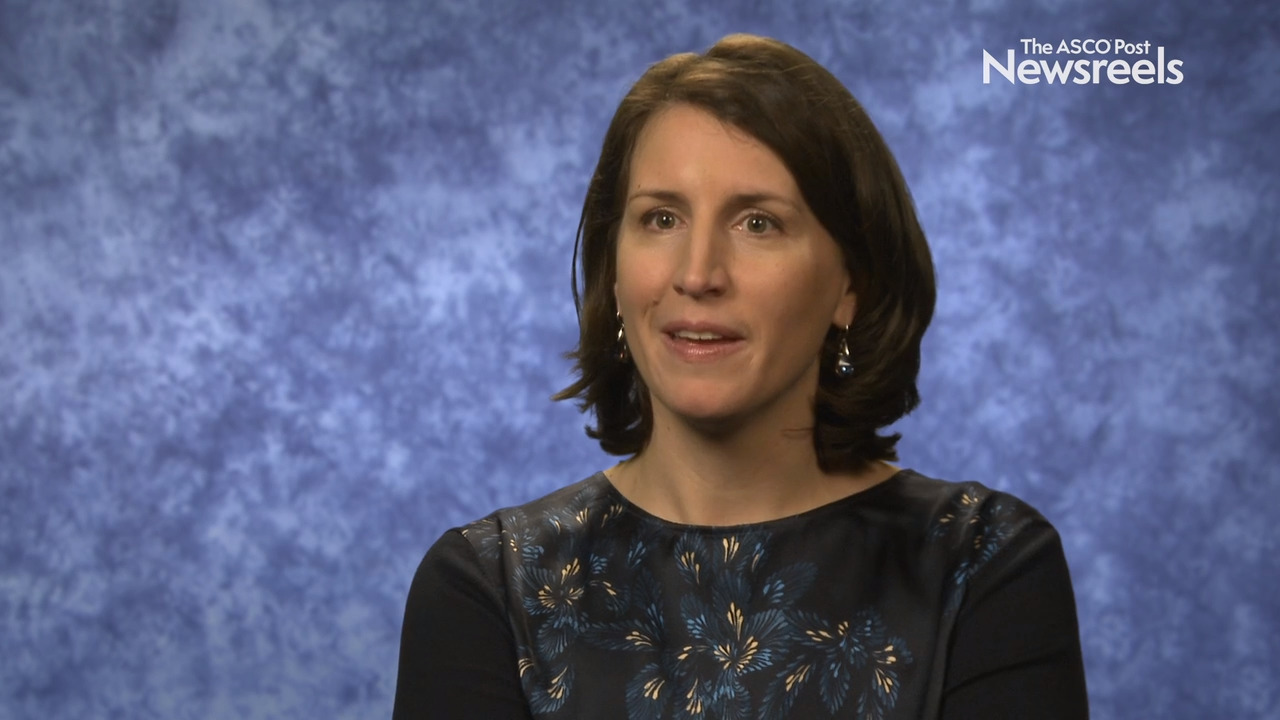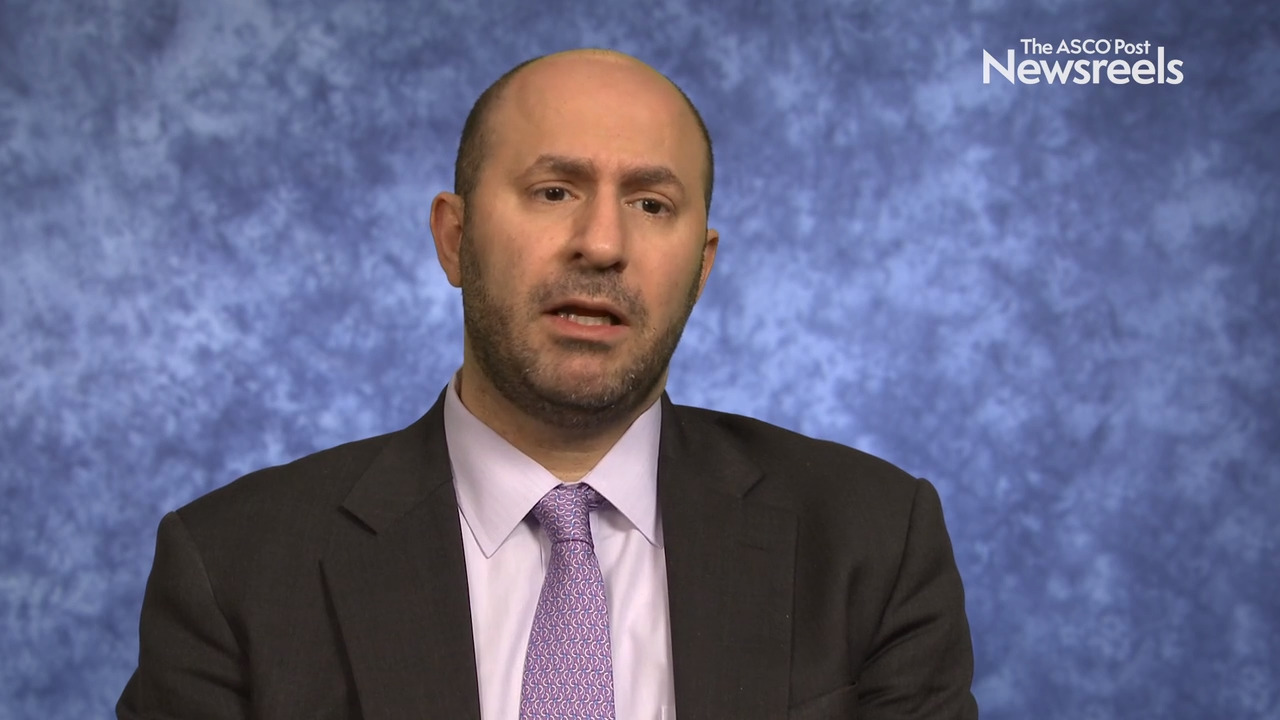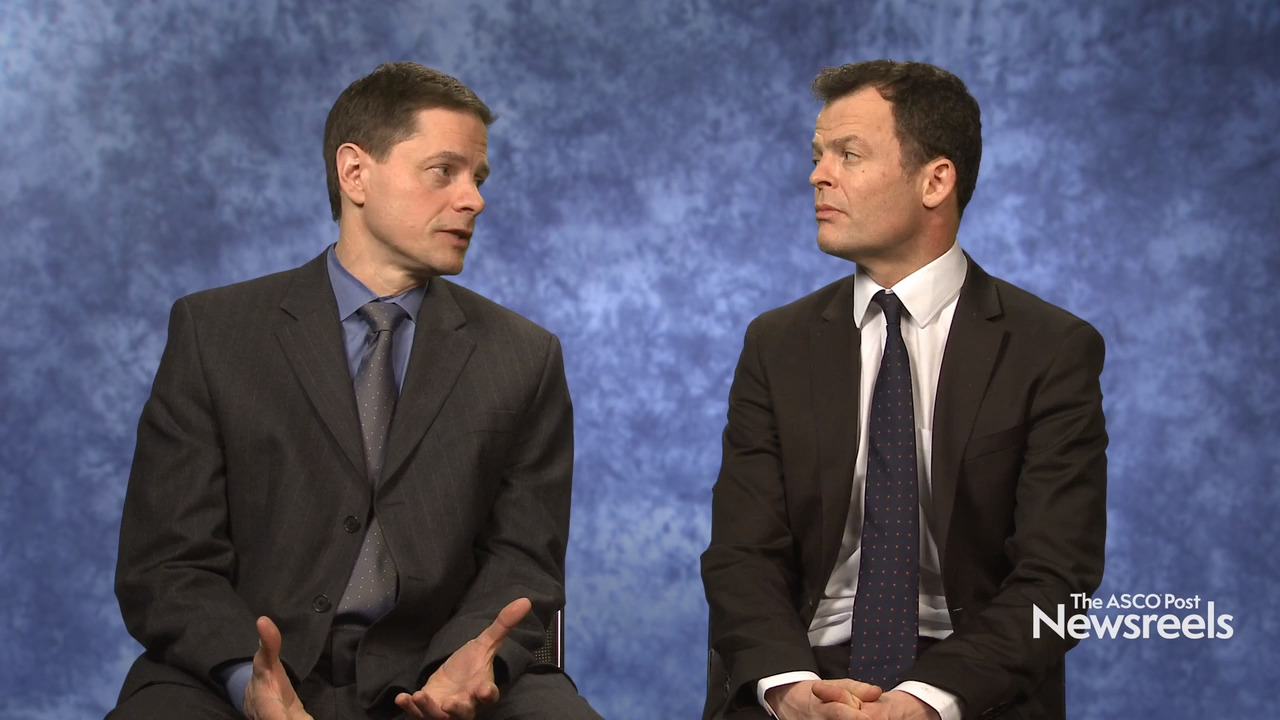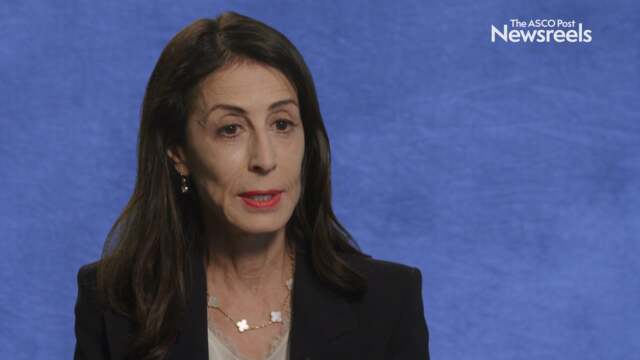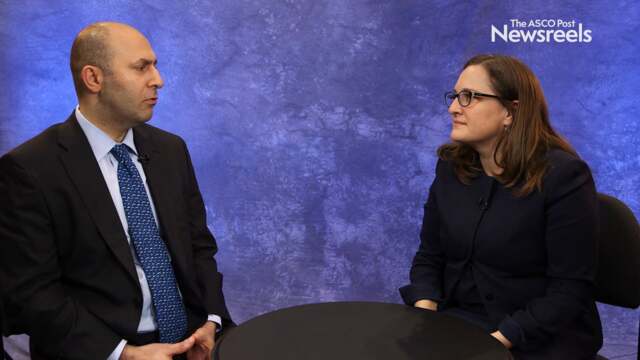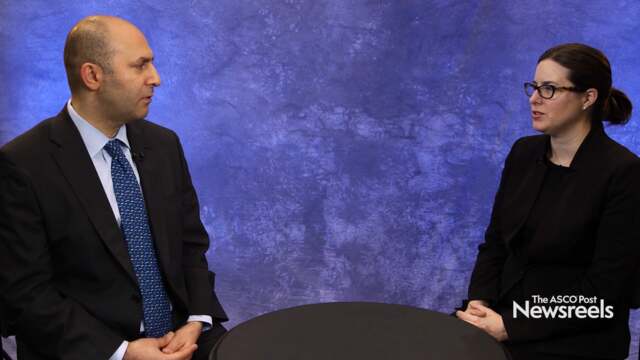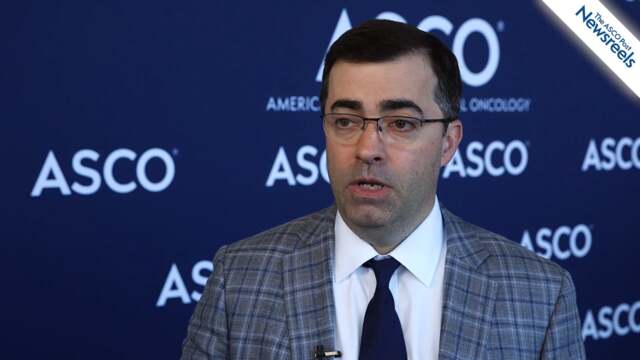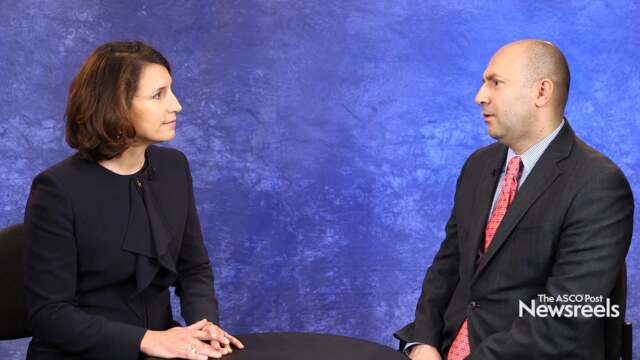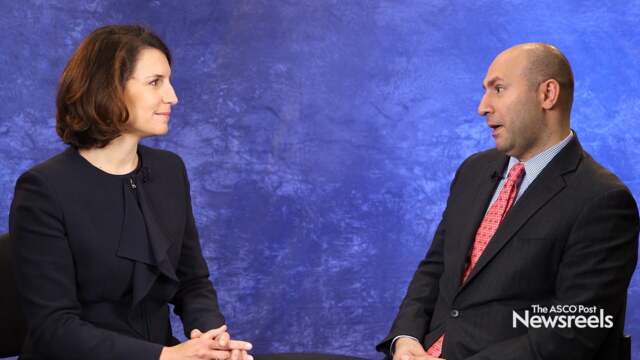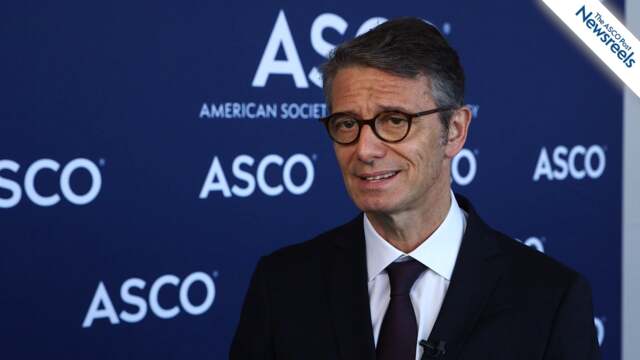Activity of Cabozantinib in Advanced Non–Clear Cell Renal Cell Carcinoma
In a retrospective cohort study reported in The Lancet Oncology, Chanzá et al found evidence of activity of cabozantinib in advanced non–clear cell renal carcinoma. Cabozantinib is approved in metastatic renal cell carcinoma on the basis of studies in clear cell histology. As noted by ...
Toni K. Choueiri, MD, and Ziad Bakouny, MD, on Renal Cell Carcinoma: Next-Generation Immuno-oncology Therapies
Toni K. Choueiri, MD, and Ziad Bakouny, MD, both of Dana-Farber Cancer Institute, talk about novel cytokines, checkpoint inhibitors, and vaccines in the treatment pipeline for renal cell carcinoma.
Pembrolizumab/Axitinib Combination Improves Outcomes vs Sunitinib in Kidney Cancer
The checkpoint inhibitor pembrolizumab plus the vascular endothelial growth factor (VEGF) tyrosine kinase inhibitor axitinib significantly improved overall survival, progression-free survival, and objective response rates vs sunitinib as first-line therapy for clear cell metastatic renal cell...
2019 GU Cancers Symposium: First-Line Pembrolizumab Plus Axitinib vs Sunitinib in Advanced Renal Cell Carcinoma
As reported at the 2019 Genitourinary Cancers Symposium (Abstract 543) and in The New England Journal of Medicine, Rini et al found significant benefits in overall and progression-free survival with the combination of pembrolizumab plus axitinib vs sunitinib in the first-line treatment of advanced...
Brian I. Rini, MD, on Renal Cell Cancer: Risk Stratification After Resection of Localized Disease
Brian I. Rini, MD, of the Cleveland Clinic Taussig Cancer Institute, discusses current models used to estimate the risk of recurrence as well as genomic data that could help pinpoint individual tumor biology.
Rana R. McKay, MD, on Renal Cell Carcinoma: Results From a Trial on Atezolizumab and Bevacizumab
Rana R. McKay, MD, of the University of California, San Diego, discusses phase II study findings on atezolizumab and bevacizumab in non–clear cell renal cell carcinoma and clear cell renal cell carcinoma with sarcomatoid differentiation (Abstract 548).
Brian I. Rini, MD, on Renal Cell Carcinoma: Results From the TIVO-3 Trial on Tivozanib vs Sorafenib
Brian I. Rini, MD, of the Cleveland Clinic Taussig Cancer Institute, discusses phase III findings on a comparison of tivozanib and sorafenib in patients with refractory advanced renal cell carcinoma (Abstract 541).
Ignacio Duran, MD, PhD, on Renal Cell Carcinoma: Results From the METEOR Trial on Cabozantinib vs Everolimus
Ignacio Duran, MD, PhD, of the Hospital Universitario Marqués de Valdecilla, discusses an overall survival analysis of the phase III METEOR trial of cabozantinib vs everolimus in advanced renal cell carcinoma (Abstract 550).
Laurence Albiges, MD, PhD, on Renal Cell Carcinoma: Results From the NIVOREN GETUG-AFU 26 Study on Nivolumab
Laurence Albiges, MD, PhD, of Gustave Roussy, discusses findings on the safety and efficacy of nivolumab used in a “real world” prospective study on metastatic renal cell carcinoma (mRCC). This research was conducted after nivolumab was approved for the treatment of mRCC following failure of one or two tyrosine kinase inhibitors (Abstract 542).
2019 GU Cancers Symposium: TIVO-3: Tivozanib vs Sorafenib in Refractory Advanced Renal Cell Carcinoma
The TIVO-3 trial was conducted to confirm progression-free survival results from the TIVO-1 trial, which found an improvement in median progression-free survival in patients with metastatic renal cell carcinoma treated with tivozanib vs sorafenib. Findings from TIVO-3 were presented by...
Toni K. Choueiri, MD, on Renal Cell Carcinoma: Trial Results on Avelumab Plus Axitinib vs Sunitinib
Toni K. Choueiri, MD, of Dana-Farber Cancer Institute, discusses a subgroup analysis from the JAVELIN Renal 101 study on outcomes for avelumab plus axitinib vs sunitinib in advanced renal cell carcinoma (Abstract 544).
Brian I. Rini, MD, and Thomas Powles, MD, PhD, on Renal Cell Carcinoma: Results From the KEYNOTE-426 Trial on Pembrolizumab Plus Axitinib vs Sunitinib
Brian I. Rini, MD, of the Cleveland Clinic Taussig Cancer Institute, and Thomas Powles, MD, PhD, of Queen Mary University of London, discuss their study findings on pembrolizumab plus axitinib vs sunitinib as first-line therapy for locally advanced or metastatic renal cell carcinoma (Abstract 543).
2019 GU Cancers Symposium: JAVELIN Renal 101: Avelumab Plus Axitinib vs Sunitinib for Advanced Kidney Cancer
A combination of two drugs could become a new standard first-line treatment for patients with metastatic kidney cancer, according to results from the JAVELIN Renal 101 trial presented at the 2019 Genitourinary Cancers Symposium (Abstract 544) and simultaneously published in The New England...
FDA Pipeline: Priority Reviews in Renal Cell Carcinoma and Head and Neck Cancer
Over the past week, the U.S. Food and Drug Administration (FDA) granted multiple Priority Reviews: Pembrolizumab in Combination With Axitinib as First-Line Treatment for Advanced Renal Cell Carcinoma Today, the FDA accepted and granted Priority Review for a new supplemental biologics license...
2019 GU Cancers Symposium: KEYNOTE-426: Pembrolizumab Plus Axitinib vs Sunitinib in Advanced Renal Cell Carcinoma
Results from the randomized, phase III KEYNOTE-426 clinical trial show that first-line therapy with a combination of pembrolizumab and axitinib extended both overall survival (OS) and progression-free survival (PFS) for patients with clear cell metastatic renal cell carcinoma compared with the...
Personalized Treatment May Extend Life Expectancy for Patients With Chronic Kidney Disease and Small Renal Tumors
Personalized treatment plans may extend life expectancy for patients with early-stage kidney cancer who also have risk factors for worsening kidney disease, according to a new study published by Kang et al in Radiology. Kidney tumors are often discovered at an early stage and are frequently...
Patient-Reported Outcomes With Nivolumab Plus Ipilimumab vs Sunitinib in Advanced Renal Cell Carcinoma
As reported in The Lancet Oncology by Cella et al, patient-reported outcomes were better with nivolumab plus ipilimumab vs sunitinib in the phase III CheckMate 214 trial among patients with intermediate- or poor-risk advanced renal cell carcinoma. The ongoing trial showed significantly improved...
Clinical Trial Commences on Personalized Vaccine in Kidney Cancer
Researchers at the Dana-Farber Cancer Institute in Boston are testing a first-of-its-kind personalized cancer vaccine combined with an immunotherapy drug, with the aim of improving outcomes for patients with kidney cancer who are at high risk of recurrence after surgery. A two-pronged approach to...
Immediate vs Deferred Cytoreductive Nephrectomy in Patients With Metastatic Renal Cell Carcinoma Treated With Sunitinib
In a trial with a modified primary endpoint due to slow accrual reported in JAMA Oncology, Bex et al found that deferred cytoreductive nephrectomy after sunitinib did not improve 28-week progression-free rate (PFR) vs immediate nephrectomy followed by sunitinib in patients with metastatic renal...
Expert Point of View: Manuela Schmidinger, MD
“TARGETED AGENTS were a breakthrough in the treatment of renal cell carcinoma, and immunotherapy also works well, improving survival. In the past 2 years, combining a checkpoint inhibitor with targeted agents appears to work even better, and multiple combination trials are underway. The outcomes...
Progress Made in Identifying Gene-Signature Biomarkers in Renal Cell Carcinoma
A NEW ANALYSIS of the phase III IMmotion151 trial identified gene signatures in renal cell carcinoma that correlate with improved progression-free survival in patients treated with atezolizumab (Tecentriq) plus bevacizumab (Avastin) vs sunitinib (Sutent). These findings were presented at the...
Adding Genomic Factors to MSKCC Risk Model in Metastatic Renal Cell Carcinoma
In a study reported in The Lancet Oncology, Voss et al found that adding the mutation status of prognostic genes to the Memorial Sloan Kettering Cancer Center (MSKCC) risk model improved the prognostic performance of the model in patients with advanced renal cell carcinoma. The study involved...
Immunotherapy and Tyrosine Kinase Inhibitor Combination in Advanced Renal Cell Carcinoma
In the JAVELIN Renal 101 phase III study, the combination of the immune checkpoint inhibitor avelumab (Bavencio), a programmed death ligand-1 (PD-L1) blocking antibody, plus the tyrosine kinase inhibitor axitinib (Inlyta) significantly improved progression-free survival in previously untreated...
Surveillance Imaging Modality and Survival After Recurrence in Favorable-Histology Wilms Tumor
Findings in a study reported by Mullen and colleagues for the Children’s Oncology Group in the Journal of Clinical Oncology suggest that routine computed tomography (CT) surveillance may not be necessary for recurrence detection in favorable-histology Wilms tumor. The study was a...
2018 ASTRO: IROCK: Stereotactic Ablative Radiotherapy for RCC in Patients With One Kidney
Treatment of renal cell carcinoma with stereotactic radiation therapy is as safe and effective for patients with one kidney as it is for those with two, according to an analysis of an international data set presented by Correa et al at the 60th Annual Meeting of the American Society for...
Laurence Albiges, MD, PhD, on RCC: Challenging Established Front-Line Treatment
Laurence Albiges, MD, PhD, of Gustave Roussy, discusses data from the global, phase III JAVELIN trial that compared axitinib plus avelumab vs sunitinib, which could lead to a new standard of care in renal cell carcinoma (Abstract LBA6_PR).
ESMO 2018: JAVELIN Renal 101: Avelumab Plus Axitinib in Previously Untreated Renal Cell Carcinoma
A combination of the immune checkpoint blocker avelumab (Bavencio) plus the tyrosine kinase inhibitor axitinib (Inlyta) improved progression-free survival (PFS) in previously untreated patients with advanced renal cell carcinoma (RCC) in the phase III JAVELIN Renal 101 study, according to results...
Nivolumab Plus Ipilimumab in Intermediate- or Poor-Risk Advanced Renal Cell Carcinoma
In the Clinic provides overviews of novel oncology agents, addressing indications, mechanisms of action, administration recommendations, safety profiles, and other essential information needed for the appropriate clinical use of these drugs. On April 16, 2018, nivolumab (Opdivo) and ipilimumab...
Cora N. Sternberg, MD, on Renal and Bladder Cancers: Focus on Immunotherapy
Cora N. Sternberg, MD, of San Camillo-Forlanini Hospital and the Israel Englander Institute of Precision Medicine at Weill Cornell, discusses results from the phase III CheckMate-025 study on nivolumab vs everolimus for mRCC; the CheckMate-214 study on nivolumab, ipilimumab, and sunitinib for treatment-naive advanced or metastatic clear-cell RCC; and immunotherapy for urothelial cancer for both first- line cisplatin-ineligible and second-line therapy after cisplatin chemotherapy.
Avelumab Plus Axitinib in Previously Untreated Patients With Advanced Kidney Cancer
The results of the pivotal phase III JAVELIN Renal 101 study—which evaluated avelumab (Bavencio) in combination with axitinib (Inlyta) compared with sunitinib (Sutent) as initial therapy for patients with advanced renal cell carcinoma—were recently announced. As part of a planned...
New Recommendations for Cabozantinib Tablets in Updated NCCN Clinical Practice Guidelines
Recently, the National Comprehensive Cancer Network® (NCCN®) updated its Clinical Practice Guidelines to include new recommendations for cabozantinib (Cabometyx) tablets. With the updates, cabozantinib is recommended by the NCCN for the treatment of advanced renal cell carcinoma regardless...
Presurgical CT Imaging of CD117-Positive Kidney Tumors
A research team from Roswell Park Comprehensive Cancer Center has discovered a way to use computed tomography (CT) imaging to assess kidney tumors that test positive for the biomarker CD117 and accurately determine—before surgery—whether the tumor is benign or malignant. Their findings...
Sunitinib vs Nephrectomy Followed by Sunitinib in Metastatic Renal Cell Carcinoma
In an interim analysis of the French phase III noninferiority Carmena trial reported in The New England Journal of Medicine, Méjean et al found that sunitinib alone was not inferior in overall survival vs nephrectomy followed by sunitinib in patients with intermediate- or poor-risk...
Meta-Analysis of Patients With Early Kidney Cancer Treated With Robotic Partial Nephrectomy
For patients with early kidney cancer, surgically removing a portion of the kidney instead of the whole organ is often a preferred treatment, because the procedure can effectively remove tumors while preserving kidney function. But when it comes to the best surgical approach—robotic,...
Large Disparities in Cancer Mortality Rates Found Among Different Racial/Ethnic Populations in New York State
According to the American Cancer Society, cancer is the leading cause of death for Hispanics and Asian/Pacific Islanders in the United States. However, their cancer burden is less than that of non-Hispanic whites and especially non-Hispanic blacks, who bear the most disproportionate share of the...
Germline Mutations in Cancer Susceptibility Genes in Patients With Advanced Renal Cell Carcinoma
In a study reported in JAMA Oncology, Carlo et al found a high prevalence of germline mutations in cancer susceptibility genes in patients with advanced renal cell carcinoma (RCC). Study Details In this cohort study, conducted between October 2015 and July 2017, 254 of 267 patients with advanced...
Percutaneous Ablation vs Nephrectomy in T1a Kidney Cancer
Many cases of early-stage kidney cancer can be treated with a relatively new, nonsurgical procedure used to destroy tumors, a new study by Talenfeld et al in Annals of Internal Medicine suggests. The procedure, called percutaneous ablation, involves the insertion of a needle through the skin into...
Nephrectomy May Be Avoided in Some Patients With Advanced Renal Cell Carcinoma
In the modern era of targeted therapy, some patients with metastatic renal cell carcinoma may be able to forgo nephrectomy and be treated with sunitinib (Sutent) alone, according to results of the phase III CARMENA trial reported during the Plenary Session at the 2018 ASCO Annual Meeting.1 The...
Nivolumab Plus Ipilimumab in Advanced Renal Cell Carcinoma: A Shift in the Treatment Paradigm
For over a decade, vascular endothelial growth factor (VEGF) tyrosine kinase inhibitors have been the standard first-line agents in the management of patients with advanced or metastatic clear cell renal cell carcinoma.1-3 Historically, phase III trials of first-line VEGF therapies included...
CheckMate 214: Nivolumab Plus Ipilimumab Improves Survival vs Sunitinib in Advanced Renal Cell Cancer
As reported in The New England Journal of Medicine by Robert J. Motzer, MD, of Memorial Sloan Kettering Cancer Center, and colleagues, the phase III CheckMate 214 trial has shown an overall survival advantage with nivolumab (Opdivo) plus ipilimumab (Yervoy) vs sunitinib (Sutent) in patients with...
2018 ASCO: KEYNOTE-427 Trial Evaluates Immunotherapy in Advanced Clear Cell Renal Cell Carcinoma
Interim results from cohort A of KEYNOTE-427, a phase II trial evaluating pembrolizumab (Keytruda) as first-line treatment for advanced clear cell renal cell carcinoma (RCC), were presented by McDermott et al at the 2018 ASCO Annual Meeting (Abstract 4500). Interim data showed an overall response...
Toni K. Choueiri, MD, and Elizabeth R. Plimack, MD, on RCC: Perspectives on KEYNOTE-427 and IMmotion151
Toni K. Choueiri, MD, of Dana-Farber Cancer Institute, and Elizabeth R. Plimack, MD, of Fox Chase Cancer Center, offer their analysis of two key studies presented in renal cell cancer.
Toni K. Choueiri, MD, and Lauren C. Harshman, MD on RCC: Results From the PROSPER Trial
Toni K. Choueiri, MD, and Lauren C. Harshman, MD, both of Dana-Farber Cancer Institute, discuss phase III study findings on perioperative nivolumab vs observation in patients with localized renal cell carcinoma undergoing nephrectomy (Abstract TPS4597).
Bernard J. Escudier, MD, on RCC: Results From the IMmotion151 Trial
Bernard J. Escudier, MD, of Gustave Roussy, discusses patient-reported outcomes for atezolizumab plus bevacizumab vs sunitinib in treatment-naive metastatic renal cell carcinoma (Abstract 4511).
David F. McDermott, MD, on RCC: Results of the KEYNOTE-427 Trial
David F. McDermott, MD, of Beth Israel Deaconess Medical Center, discusses study findings on pembrolizumab monotherapy as first-line therapy in advanced clear cell renal cell carcinoma (Abstract 4500).
Laurence Albiges, MD, PhD, and Toni K. Choueiri, MD, on RCC: Novel Combinations for Advanced Disease
Toni K. Choueiri, MD, of Dana-Farber Cancer Institute, and Laurence Albiges, MD, PhD, of Gustave Roussy, discuss two treatment studies: one testing pegilodecakin with nivolumab or pembrolizumab and the other evaluating an oral CXCR4 inhibitor in combination with axitinib (Abstracts 4509 & 4510).
Laurence Albiges, MD, PhD, and Toni K. Choueiri, MD, on Metastatic RCC: Perspectives on the Carmena Trial
Toni K. Choueiri, MD, of Dana-Farber Cancer Institute, and Laurence Albiges, MD, PhD, of Gustave Roussy, discuss the implications of this study’s potentially practice-changing finding that nephrectomy is no longer the standard of care for patients with metastatic renal cell carcinoma (Abstract LBA3).
Arnaud Méjean, MD, PhD, on RCC: Results From the Carmena Trial
Arnaud Méjean, MD, PhD, of the Hôpital Européen Georges Pompidou, discusses his study’s potentially practice-changing finding that nephrectomy is no longer the standard of care for patients with metastatic renal cell carcinoma (Abstract LBA3).
2018 ASCO: Carmena Trial Compares Nephrectomy Plus Adjuvant Sunitinib vs Sunitinib Alone in Metastatic RCC
The randomized phase III Carmena trial showed that many people with advanced kidney cancer can avoid nephrectomy without compromising survival. The median overall survival for people who received the targeted therapy sunitinib (Sutent) alone was 18.4 months, compared with 13.9 months for those who...
Update on ATLAS Trial of Axitinib for RCC Recurrence Risk
Pfizer recently announced that the independent data monitoring committee for the phase III ATLAS trial, which is evaluating axitinib (Inlyta) as adjuvant therapy for patients at high risk of recurrent renal cell carcinoma (RCC) after nephrectomy, recommended stopping the trial at a planned interim...
